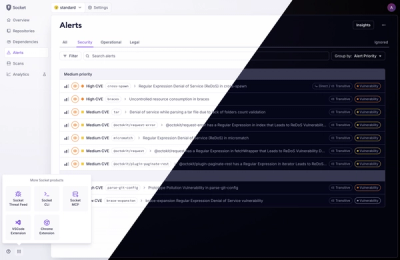
Product
A Fresh Look for the Socket Dashboard
We’ve redesigned the Socket dashboard with simpler navigation, less visual clutter, and a cleaner UI that highlights what really matters.
cacheman-promise
Advanced tools
Cacheman library with a promise interface.
$ npm install --save cacheman-promise
Cacheman-promise only support set, get, del, clear, pull and wrap promise interface.
Please refer to Cacheman Options API
var Cacheman = require('cacheman-promise');
var options = {
ttl: 90,
engine: 'redis',
port: 9999,
host: '127.0.0.1'
};
var cache = new Cacheman('todo', options);
// or
var cache = new Cacheman(options);
Usage:
var key = 'foo';
var data = 'bar';
cache.set(key, {name: data})
.then(function(val){
// output "{name: 'bar'}"
console.log(val);
});
You can pass array or string as key.
Usage:
cache.set('foo', 'bar');
cache.get('foo')
.then(function(val){
// output "bar"
console.log(val);
});
pass array as multiple keys
Usage:
cache.set('foo', 1);
cache.set('bar', 2);
cache.get(['foo', 'bar'])
.then(function(result){
// output {"foo": 1, "bar": 2}
console.log(result);
});
If you need to retrieve an item from the cache and then delete it, you may use the pull method. Like the get method, null will be returned if the item does not exist in the cache.
cache.set('foo', 'bar');
cache.pull('foo')
.then(function(result){
// output 'bar'
console.log(result);
}).then(function() {
return cache.get('foo');
}).then(function(result) {
// output 'null'
console.log(result);
});
You can pass default value as second paramaeter if the item doesn't exist in the cache.
// make sure `foo` cache doesn't exist.
cache.del('foo');
cache.pull('foo', 'bar')
.then(function(result){
// output 'bar'
console.log(result);
});
You can pass array or string as key.
Usage:
cache.del('foo')
.then(function(){
console.log('foo was deleted');
});
or
cache.del(['foo', 'bar'])
.then(function(){
console.log('foo and bar was deleted');
});
Clear some items with prefix name:
cache.clear('foo*')
.then(function(){
console.log('clear cache with `foo` prefix name like `foo1`, `foo2` etc.');
});
Clear all cache as follwoing:
cache.clear()
.then(function(){
console.log('cache is now clear');
});
Wraps a function in cache. I.e., the first time the function is run, its results are stored in cache so subsequent calls retrieve from cache instead of calling the function.
var key = 'foo';
var data = 'bar';
cache.wrap(key, data)
.then(function(val) {
// get foo key from cache
return cache.get(key);
}).then(function(val) {
// output 'bar'
console.log(val);
});
$ npm test
FAQs
cacheman with a promise interface.
The npm package cacheman-promise receives a total of 2 weekly downloads. As such, cacheman-promise popularity was classified as not popular.
We found that cacheman-promise demonstrated a not healthy version release cadence and project activity because the last version was released a year ago. It has 1 open source maintainer collaborating on the project.
Did you know?

Socket for GitHub automatically highlights issues in each pull request and monitors the health of all your open source dependencies. Discover the contents of your packages and block harmful activity before you install or update your dependencies.

Product
We’ve redesigned the Socket dashboard with simpler navigation, less visual clutter, and a cleaner UI that highlights what really matters.

Industry Insights
Terry O’Daniel, Head of Security at Amplitude, shares insights on building high-impact security teams, aligning with engineering, and why AI gives defenders a fighting chance.

Security News
MCP spec updated with structured tool output, stronger OAuth 2.1 security, resource indicators, and protocol cleanups for safer, more reliable AI workflows.